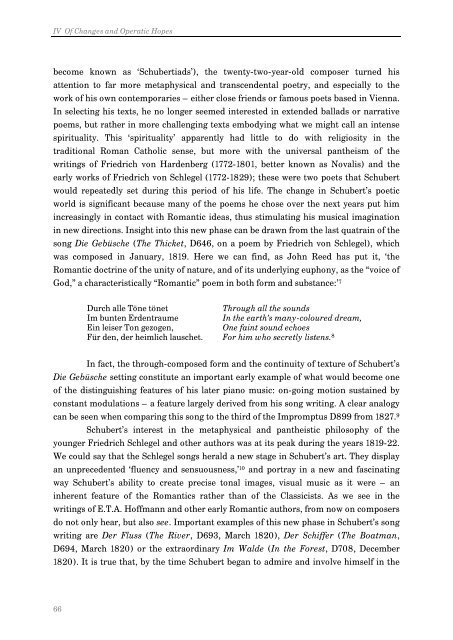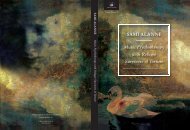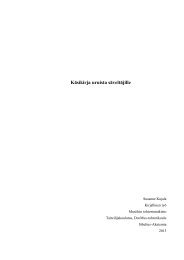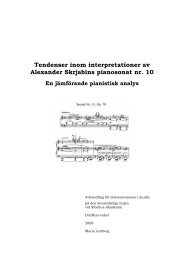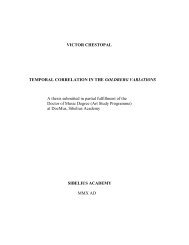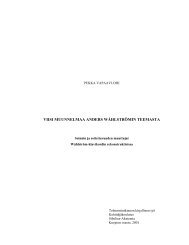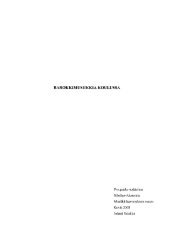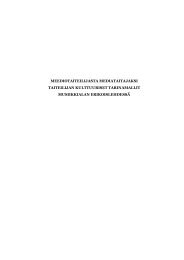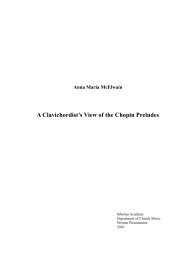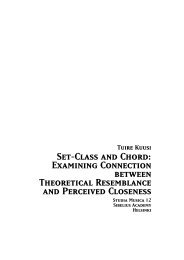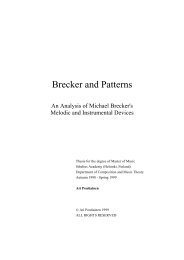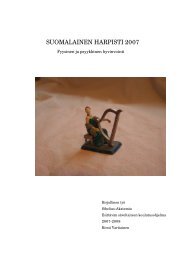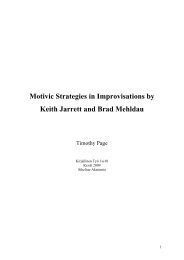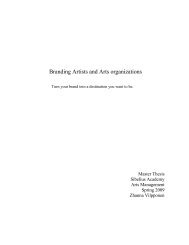The Unfinished Piano Sonatas of Franz Schubert Javier ... - Ethesis
The Unfinished Piano Sonatas of Franz Schubert Javier ... - Ethesis
The Unfinished Piano Sonatas of Franz Schubert Javier ... - Ethesis
You also want an ePaper? Increase the reach of your titles
YUMPU automatically turns print PDFs into web optimized ePapers that Google loves.
IV Of Changes and Operatic Hopes<br />
become known as ‘<strong>Schubert</strong>iads’), the twenty-two-year-old composer turned his<br />
attention to far more metaphysical and transcendental poetry, and especially to the<br />
work <strong>of</strong> his own contemporaries – either close friends or famous poets based in Vienna.<br />
In selecting his texts, he no longer seemed interested in extended ballads or narrative<br />
poems, but rather in more challenging texts embodying what we might call an intense<br />
spirituality. This ‘spirituality’ apparently had little to do with religiosity in the<br />
traditional Roman Catholic sense, but more with the universal pantheism <strong>of</strong> the<br />
writings <strong>of</strong> Friedrich von Hardenberg (1772-1801, better known as Novalis) and the<br />
early works <strong>of</strong> Friedrich von Schlegel (1772-1829); these were two poets that <strong>Schubert</strong><br />
would repeatedly set during this period <strong>of</strong> his life. <strong>The</strong> change in <strong>Schubert</strong>’s poetic<br />
world is significant because many <strong>of</strong> the poems he chose over the next years put him<br />
increasingly in contact with Romantic ideas, thus stimulating his musical imagination<br />
in new directions. Insight into this new phase can be drawn from the last quatrain <strong>of</strong> the<br />
song Die Gebüsche (<strong>The</strong> Thicket, D646, on a poem by Friedrich von Schlegel), which<br />
was composed in January, 1819. Here we can find, as John Reed has put it, ‘the<br />
Romantic doctrine <strong>of</strong> the unity <strong>of</strong> nature, and <strong>of</strong> its underlying euphony, as the “voice <strong>of</strong><br />
God,” a characteristically “Romantic” poem in both form and substance:’ 7<br />
66<br />
Durch alle Töne tönet<br />
Im bunten Erdentraume<br />
Ein leiser Ton gezogen,<br />
Für den, der heimlich lauschet.<br />
Through all the sounds<br />
In the earth’s many-coloured dream,<br />
One faint sound echoes<br />
For him who secretly listens. 8<br />
In fact, the through-composed form and the continuity <strong>of</strong> texture <strong>of</strong> <strong>Schubert</strong>’s<br />
Die Gebüsche setting constitute an important early example <strong>of</strong> what would become one<br />
<strong>of</strong> the distinguishing features <strong>of</strong> his later piano music: on-going motion sustained by<br />
constant modulations – a feature largely derived from his song writing. A clear analogy<br />
can be seen when comparing this song to the third <strong>of</strong> the Impromptus D899 from 1827. 9<br />
<strong>Schubert</strong>’s interest in the metaphysical and pantheistic philosophy <strong>of</strong> the<br />
younger Friedrich Schlegel and other authors was at its peak during the years 1819-22.<br />
We could say that the Schlegel songs herald a new stage in <strong>Schubert</strong>’s art. <strong>The</strong>y display<br />
an unprecedented ‘fluency and sensuousness,’ 10 and portray in a new and fascinating<br />
way <strong>Schubert</strong>’s ability to create precise tonal images, visual music as it were – an<br />
inherent feature <strong>of</strong> the Romantics rather than <strong>of</strong> the Classicists. As we see in the<br />
writings <strong>of</strong> E.T.A. H<strong>of</strong>fmann and other early Romantic authors, from now on composers<br />
do not only hear, but also see. Important examples <strong>of</strong> this new phase in <strong>Schubert</strong>’s song<br />
writing are Der Fluss (<strong>The</strong> River, D693, March 1820), Der Schiffer (<strong>The</strong> Boatman,<br />
D694, March 1820) or the extraordinary Im Walde (In the Forest, D708, December<br />
1820). It is true that, by the time <strong>Schubert</strong> began to admire and involve himself in the


